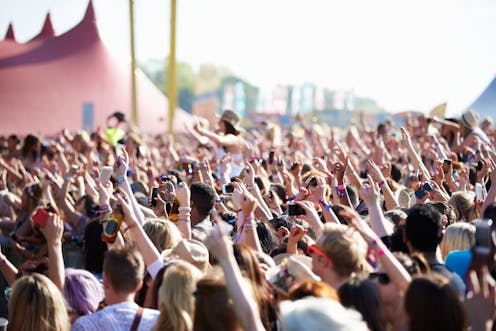Planning to use drugs at a festival on a scorching summer day? Here's why extreme heat might make MDMA riskier
- Written by Milad Haghani, Senior Lecturer of Public Safety & Disaster Risk, UNSW Sydney

Sydney and other parts of Australia have just experienced a significant heatwave, with temperatures reaching highs of well over 40°C. In Sydney in particular, the extreme heat has coincided with a bustling schedule of live music events, attracting large crowds despite the sweltering conditions.
Drug experts raised concerns ahead of the sold-out Epik festival which took place at Sydney Olympic Park on Saturday, cautioning revellers against the dangers of taking illicit drugs in extreme heat.
Reports have since emerged that four festival patrons were taken to hospital for reasons relating to drugs.
While illicit drug use is dangerous no matter the circumstances, extremely hot weather may make it even more risky.
Read more: 5 reasons why climate change may see more of us turn to alcohol and other drugs
Drug use at festivals
We know the use of recreational drugs is common at live music events such as festivals. Studies have shown people who frequently attend music festivals and dance events tend to have more experience with illegal substances than their counterparts who don’t attend these events.
Wastewater analyses have confirmed the prevalence of drug use at music festivals.
In Australia and overseas, several live music events have been marred by tragedies linked to drug use. As recently as October, two men, aged 21 and 26, died following suspected drug overdoses at the Knockout music festival in Sydney.
At these sorts of events, MDMA (or ecstasy) is among the most commonly used substances. And when taken during extreme heat, the risks could be much greater.
MDMA and hot weather
MDMA triggers the release of substances that interfere with our temperature regulation, leading the body to generate more heat than usual. This effect is known as hyperthermia (as opposed to hypothermia, when the body gets too cold).
This elevation in body temperature happens even if the person using drugs is not exerting themselves and not in a hot environment. In this context, the effect can still cause dehydration.
However, the effects may be greater if a person is exerting themselves in hot, crowded settings. Studies have shown that on average, for a person who takes MDMA somewhere like a dance club, their body temperature can increase by more than 1°C.
In extreme cases, a sharp increase in body temperature can lead to organ failure and even death.
Extreme heat may compound the hyperthermia induced by taking the drug. A study in rats showed a moderate dose of MDMA that is typically non-fatal in cool, quiet environments can be fatal in rats exposed to conditions that mimic the hot, crowded settings where people often use the drug.
What now?
Illicit drugs pose significant dangers to people who use them at music festivals and elsewhere.
Meanwhile, with climate change, we are set to face more frequent and intense heatwaves in the future. So it’s important to better understand how the weather might intensify the risks of drug use.
Read more: Testing festival goers' pills isn't the only way to reduce overdoses. Here's what else works
The principles of harm reduction recognise that, despite our best efforts to educate people about the risks associated with substance use, some people will continue to experiment with drugs at music festivals. So it becomes essential to minimise potential harms through evidence-based strategies, such as pill testing.
Harm reduction messages play a vital role in educating music festival attendees about the dangers of drug use, especially in hot conditions. These messages must encourage seeking medical help without fear of repercussions, staying hydrated, taking regular breaks, and wearing appropriate clothing for sun protection. Public officials, event organisers, families and friends can all contribute to spreading these messages, though attendees also need to exercise personal responsibility.
Messaging should also stress the importance of patrons looking out for their friends, highlighting everyone has a role in maintaining a safe environment at these events.
Read more: It's extremely hot and I'm feeling weak and dizzy. Could I have heat stroke?
Authors: Milad Haghani, Senior Lecturer of Public Safety & Disaster Risk, UNSW Sydney





